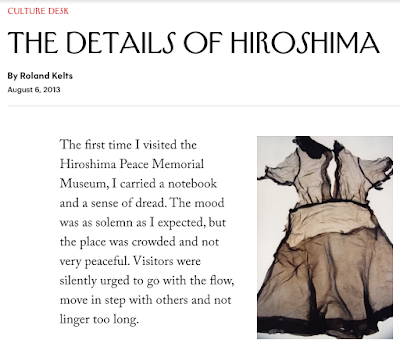Roland Kelts's Blog, page 15
August 22, 2020
JAPANAMERICA at Virtual Crunchyroll Expo 2020, Sept. 4 - 6
Published on August 22, 2020 23:32
August 11, 2020
BBC TV interview on virtual sex and Japan's declining birth rate
(click to play) I gave an interview in Tokyo to the BBC for a documentary about Japan's birth rate.I talked about Japan's expanding menu of options for virtual romance and sex — from dating sims to erotic manga, anime and video games.
It's not just Japan, of course. The annual birth rate here remains higher than it is in South Korea, Singapore or Hong Kong, and birth rates have also been steadily declining in the United States and across Europe.
Options for virtual romance and sex are increasingly popular in developed nations worldwide. Dating app, internet hookup and pornography addiction are hackneyed phrases by now.
But what I didn't know during the shoot was that virtual romance and sex would be among the safest, sanest and most responsible options for intimacy in the middle of a global pandemic.
It's not just Japan, of course. The annual birth rate here remains higher than it is in South Korea, Singapore or Hong Kong, and birth rates have also been steadily declining in the United States and across Europe.
Options for virtual romance and sex are increasingly popular in developed nations worldwide. Dating app, internet hookup and pornography addiction are hackneyed phrases by now.
But what I didn't know during the shoot was that virtual romance and sex would be among the safest, sanest and most responsible options for intimacy in the middle of a global pandemic.
Published on August 11, 2020 05:32
My BBC interview on virtual sex and Japan's declining birth rate
(click to play) I gave an interview in Tokyo to the BBC for a documentary about Japan's birth rate.I talked about Japan's expanding menu of options for virtual romance and sex — from dating sims to erotic manga, anime and video games.
It's not just Japan, of course. The annual birth rate here remains higher than it is in South Korea, Singapore or Hong Kong, and birth rates have also been steadily declining in the United States and across Europe.
Options for virtual romance and sex are increasingly popular in developed nations worldwide. Dating app, internet hookup and pornography addiction are hackneyed phrases by now.
But what I didn't know during the shoot was that virtual romance and sex would be among the safest, sanest and most responsible options for intimacy in the middle of a global pandemic.
It's not just Japan, of course. The annual birth rate here remains higher than it is in South Korea, Singapore or Hong Kong, and birth rates have also been steadily declining in the United States and across Europe.
Options for virtual romance and sex are increasingly popular in developed nations worldwide. Dating app, internet hookup and pornography addiction are hackneyed phrases by now.
But what I didn't know during the shoot was that virtual romance and sex would be among the safest, sanest and most responsible options for intimacy in the middle of a global pandemic.
Published on August 11, 2020 05:32
On virtual sex and Japan's declining birth rate for British TV
I gave an interview (above) in Tokyo to the BBC for a documentary about Japan's birth rate.I was cast to talk about Japan's expanding menu of options for virtual romance and sex — from dating sims to erotic manga, anime and video games.
The annual birth rate in Japan remains higher than it is in South Korea, Singapore or Hong Kong, and birth rates have also been steadily declining in the United States and across Europe.
Options for virtual romance and sex are increasingly popular in developed nations worldwide. Dating app, internet hookup and pornography addiction are hackneyed phrases by now.
But what I didn't know during the shoot was that virtual romance and sex would be among the safest, sanest and most responsible options for intimacy in the middle of an expanding global pandemic.
We all know this now, wherever we are.
Published on August 11, 2020 05:32
August 6, 2020
August 4, 2020
Returning to my Japan Times column for "Ghost of Tsushima"
Soundtrack to Ghost of Tsushima stands out for its seamless blend of musical influences
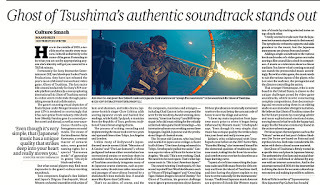 The Japan Times
The Japan Times
Here in the middle of 2020, a terrible year by nearly every measure, cultural authenticity is the name of the game. Pretending to be what you are not by appropriating anyone else’s identity will get you canceled in a TikTok minute.
Fortunately for Sony Interactive Entertainment (SIE) and developer Sucker Punch Productions, they have just released the year’s most celebrated transcultural video game, Ghost of Tsushima. The last major title created exclusively for Sony’s PS4 console platform and already a money-spinning international hit, Ghost of Tsushima earned its online street credentials through painstaking research and collaboration.
The game’s stunning visual depiction of feudal Japan under Mongol invasion in the year 1274 is rendered so convincingly that it has won praise from industry critics both here (Weekly Famitsu gave it a coveted perfect score) and abroad, as well as near-unanimous thumbs-ups from gamers on social media. The estate of the late director Akira Kurosawa, a seminal master of samurai epics, granted naming rights for a special “Kurosawa mode” of gameplay in grainy ’50s-style black-and-white.
But what casual players may find most impressive is the game’s culture-meshing soundtrack.

Two composers, England’s Ilan Eshkeri and Japan’s Shigeru Umebayashi, blend Western orchestral ensembles with artists of traditional Japanese instruments — the biwa (lute), shakuhachi (bamboo flute), stringed koto and shamisen, and taiko drums. Japanese-Scottish singer Clare Uchima adds soaring Japanese vocals and hushed line readings, while Radik Tyulyush, a musician from the Republic of Tuva, performs traditional Tuvan throat-singing chants.
The process of writing, recording and implementing the music took over two years and spanned three cities: Tokyo, Los Angeles and London.
 Recording session at AIR Studios, London
Recording session at AIR Studios, London
Read >>
 The Japan Times
The Japan TimesHere in the middle of 2020, a terrible year by nearly every measure, cultural authenticity is the name of the game. Pretending to be what you are not by appropriating anyone else’s identity will get you canceled in a TikTok minute.
Fortunately for Sony Interactive Entertainment (SIE) and developer Sucker Punch Productions, they have just released the year’s most celebrated transcultural video game, Ghost of Tsushima. The last major title created exclusively for Sony’s PS4 console platform and already a money-spinning international hit, Ghost of Tsushima earned its online street credentials through painstaking research and collaboration.
The game’s stunning visual depiction of feudal Japan under Mongol invasion in the year 1274 is rendered so convincingly that it has won praise from industry critics both here (Weekly Famitsu gave it a coveted perfect score) and abroad, as well as near-unanimous thumbs-ups from gamers on social media. The estate of the late director Akira Kurosawa, a seminal master of samurai epics, granted naming rights for a special “Kurosawa mode” of gameplay in grainy ’50s-style black-and-white.
But what casual players may find most impressive is the game’s culture-meshing soundtrack.

Two composers, England’s Ilan Eshkeri and Japan’s Shigeru Umebayashi, blend Western orchestral ensembles with artists of traditional Japanese instruments — the biwa (lute), shakuhachi (bamboo flute), stringed koto and shamisen, and taiko drums. Japanese-Scottish singer Clare Uchima adds soaring Japanese vocals and hushed line readings, while Radik Tyulyush, a musician from the Republic of Tuva, performs traditional Tuvan throat-singing chants.
The process of writing, recording and implementing the music took over two years and spanned three cities: Tokyo, Los Angeles and London.
 Recording session at AIR Studios, London
Recording session at AIR Studios, London
Read >>
Published on August 04, 2020 05:30
July 24, 2020
Judging the "Youth with Refugees Art Contest" for the UNHCR
I've been honored to serve as a judge alongside Miyavi Lee Ishihara (MIYAVI), Geoffrey Wexler from Studio Ponoc, actress Kat Graham and others for the UNHCR, the UN Refugee Agency's "Youth with Refugees Art Contest."
Winning illustrations were just announced and have been turned into charming anime by Japanese studio SPEED INC. The drawings were submitted by youth from around the world. This is a wonderful project on an urgent matter at a critical time. Open your hearts.
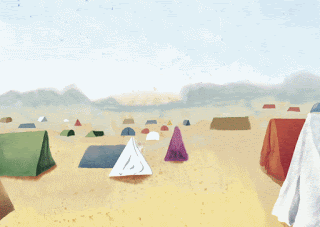 Faida, 20, Rwanda
Faida, 20, Rwanda
 Noémie, 16, France
Noémie, 16, France
Winning illustrations were just announced and have been turned into charming anime by Japanese studio SPEED INC. The drawings were submitted by youth from around the world. This is a wonderful project on an urgent matter at a critical time. Open your hearts.
 Faida, 20, Rwanda
Faida, 20, Rwanda Noémie, 16, France
Noémie, 16, France
Published on July 24, 2020 02:48
July 21, 2020
My TED Talk on Japanese Culture at Haneda Airport, Tokyo
Back when you still could, I gave a talk for TEDxTokyo in a hangar at Haneda Airport.
The topic was "Cool Japan." But this time I didn't talk about anime, manga, video games or fashion. Instead I focused on core cultural values expressed in Japanese words such as jishuku (restraint, discipline), gaman (endurance and perseverance amid adversity), ganbaru (to fight on, keep at it, stand firm) and wa (seeking and maintaining communal harmony).
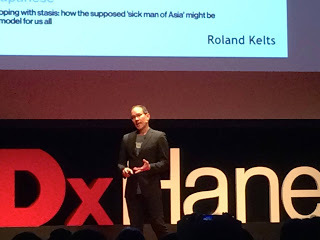
I didn't know then that such values would serve Japan well during a global pandemic.
It was a remarkable event. At the reception there were canapes and wine and we watched a guitarist bring the sun down near the nose of a plane.

Now it all seems surreal and, sadly, would be impossible.
(Video of my presentation has been posted here.)
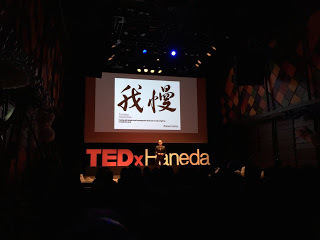

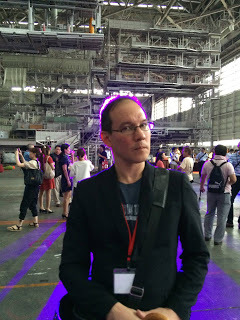
The topic was "Cool Japan." But this time I didn't talk about anime, manga, video games or fashion. Instead I focused on core cultural values expressed in Japanese words such as jishuku (restraint, discipline), gaman (endurance and perseverance amid adversity), ganbaru (to fight on, keep at it, stand firm) and wa (seeking and maintaining communal harmony).

I didn't know then that such values would serve Japan well during a global pandemic.
It was a remarkable event. At the reception there were canapes and wine and we watched a guitarist bring the sun down near the nose of a plane.

Now it all seems surreal and, sadly, would be impossible.
(Video of my presentation has been posted here.)



Published on July 21, 2020 08:55
July 15, 2020
Inside Studio Ghibli with Hayao Miyazaki, by Steve Alpert - review & interview
New book goes inside Studio Ghibli with Hayao Miyazaki
Steve Alpert worked there for 15 years and knew major players
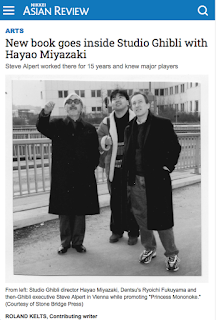 Nikkei Asian Review
Nikkei Asian Review
TOKYO — Steve Alpert's book comes advertised as a business memoir, though you may find yourself grinning more often than annotating. For 15 years, starting in 1996, the American headed the international division at Studio Ghibli, Japan's most commercially and artistically successful anime company.
As their first non-Japanese hire, he negotiated with clients from Asia, Europe and the U.S., supervised the English-language translations of "Princess Mononoke" and "Spirited Away," voice-acted a character in Japanese for 2013's "The Wind Rises," and accepted awards on his employer's behalf at prestigious global film festivals.
He also clinched the indie studio's nascent distribution deal with Disney, a coup to bring the films of Hayao Miyazaki into living rooms worldwide on VHS and DVD — and an Oscar to their visionary creator.
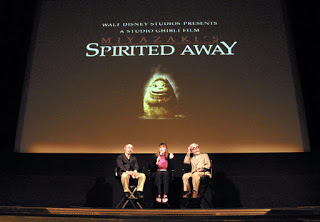 Suzuki, left, and Miyazaki, right, are joined onstage by interpreter Linda Hoagland at a press conference and screening of "Spirited Away" in Hollywood in 2002. © Getty Images
Suzuki, left, and Miyazaki, right, are joined onstage by interpreter Linda Hoagland at a press conference and screening of "Spirited Away" in Hollywood in 2002. © Getty Images
The title of Alpert's book, Sharing a House with the Never-Ending Man, refers to six-time retiree Miyazaki who, at 79, is back making movies, and the book itself is a much wilder ride than most in its genre. Alpert combines a comedian's sense of timing and self-deprecation with a novelist's eye for killer scenes.
The book's four key characters -- producer Toshio Suzuki, the late media mogul Yasuyoshi Tokuma who funded Ghibli, genius Miyazaki and outsider Alpert, peering through the looking glass -- weave in and around the action like a crack ensemble, their eccentricities often thrown into hilarious relief by Japan's rigid corporate culture.
Alpert fears for his life during long commutes in gadget-geek Suzuki's kitted-out car; sequesters in the corner of a park to rehearse company speeches in formal Japanese ("like trying to eat or drink immediately after a trip to the dentist, you think you're doing it right, but you can't really tell"); slurps ice cream and pudding under the silent gaze of his charismatic overlord, Tokuma; and nearly loses Miyazaki's precious Golden Bear trophy for best film at the Berlin International Film Festival by leaving it at the wrong airport gate.
Recounting his bumbling misadventures, Alpert earns more than a few empathetic nods, especially from those who have lived and worked overseas.
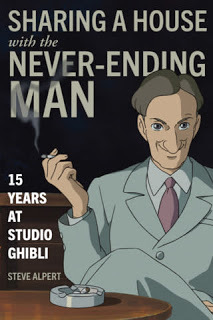 Alpert appears as a Ghibli character on the cover of his book. (Stone Bridge Press)
Alpert appears as a Ghibli character on the cover of his book. (Stone Bridge Press)
Descriptions of Japan's seemingly endless official welcome greetings, and lengthy compulsory meetings held after everyone has already agreed on their outcome, epitomize his host society's tendency to elevate form over content. Still, they are conveyed with genuine fascination and respect.
I first interviewed Alpert several years ago, when he gave me a tour of Ghibli's studio complex and helped arrange my conversations with Miyazaki. Recently, I spoke to him on a video call from his home near New Haven, Connecticut, in the U.S. "Sharing a House with the Never-Ending Man" may be the only behind-the-scenes book about Studio Ghibli we ever get — at least until Miyazaki finally retires for good.
Roland Kelts: Miyazaki comes across exactly like the paradoxical personality I've met: outwardly grumpy about food and business travel, but ultimately cheerful and kindly. He micromanages his films in Japan yet doesn't seem to care much what happens to them when they're sold abroad.
Steve Alpert: Yeah, he usually doesn't even watch the dubbed versions of his films. But the one he did watch was "Howl's Moving Castle." And the reason he did [laughs] was because we had a screening at the Museum of Modern Art in New York, and the legendary actress Lauren Bacall, who voiced a role, was going to attend.
Miyazaki said, "The Lauren Bacall will be there? I'm going!" He sat next to her through the entire film. She flirted with him and held his hand. Afterward, he said he loved the dub. He was very happy.
Read>>
Steve Alpert worked there for 15 years and knew major players
 Nikkei Asian Review
Nikkei Asian ReviewTOKYO — Steve Alpert's book comes advertised as a business memoir, though you may find yourself grinning more often than annotating. For 15 years, starting in 1996, the American headed the international division at Studio Ghibli, Japan's most commercially and artistically successful anime company.
As their first non-Japanese hire, he negotiated with clients from Asia, Europe and the U.S., supervised the English-language translations of "Princess Mononoke" and "Spirited Away," voice-acted a character in Japanese for 2013's "The Wind Rises," and accepted awards on his employer's behalf at prestigious global film festivals.
He also clinched the indie studio's nascent distribution deal with Disney, a coup to bring the films of Hayao Miyazaki into living rooms worldwide on VHS and DVD — and an Oscar to their visionary creator.
 Suzuki, left, and Miyazaki, right, are joined onstage by interpreter Linda Hoagland at a press conference and screening of "Spirited Away" in Hollywood in 2002. © Getty Images
Suzuki, left, and Miyazaki, right, are joined onstage by interpreter Linda Hoagland at a press conference and screening of "Spirited Away" in Hollywood in 2002. © Getty ImagesThe title of Alpert's book, Sharing a House with the Never-Ending Man, refers to six-time retiree Miyazaki who, at 79, is back making movies, and the book itself is a much wilder ride than most in its genre. Alpert combines a comedian's sense of timing and self-deprecation with a novelist's eye for killer scenes.
The book's four key characters -- producer Toshio Suzuki, the late media mogul Yasuyoshi Tokuma who funded Ghibli, genius Miyazaki and outsider Alpert, peering through the looking glass -- weave in and around the action like a crack ensemble, their eccentricities often thrown into hilarious relief by Japan's rigid corporate culture.
Alpert fears for his life during long commutes in gadget-geek Suzuki's kitted-out car; sequesters in the corner of a park to rehearse company speeches in formal Japanese ("like trying to eat or drink immediately after a trip to the dentist, you think you're doing it right, but you can't really tell"); slurps ice cream and pudding under the silent gaze of his charismatic overlord, Tokuma; and nearly loses Miyazaki's precious Golden Bear trophy for best film at the Berlin International Film Festival by leaving it at the wrong airport gate.
Recounting his bumbling misadventures, Alpert earns more than a few empathetic nods, especially from those who have lived and worked overseas.
 Alpert appears as a Ghibli character on the cover of his book. (Stone Bridge Press)
Alpert appears as a Ghibli character on the cover of his book. (Stone Bridge Press)Descriptions of Japan's seemingly endless official welcome greetings, and lengthy compulsory meetings held after everyone has already agreed on their outcome, epitomize his host society's tendency to elevate form over content. Still, they are conveyed with genuine fascination and respect.
I first interviewed Alpert several years ago, when he gave me a tour of Ghibli's studio complex and helped arrange my conversations with Miyazaki. Recently, I spoke to him on a video call from his home near New Haven, Connecticut, in the U.S. "Sharing a House with the Never-Ending Man" may be the only behind-the-scenes book about Studio Ghibli we ever get — at least until Miyazaki finally retires for good.
Roland Kelts: Miyazaki comes across exactly like the paradoxical personality I've met: outwardly grumpy about food and business travel, but ultimately cheerful and kindly. He micromanages his films in Japan yet doesn't seem to care much what happens to them when they're sold abroad.
Steve Alpert: Yeah, he usually doesn't even watch the dubbed versions of his films. But the one he did watch was "Howl's Moving Castle." And the reason he did [laughs] was because we had a screening at the Museum of Modern Art in New York, and the legendary actress Lauren Bacall, who voiced a role, was going to attend.
Miyazaki said, "The Lauren Bacall will be there? I'm going!" He sat next to her through the entire film. She flirted with him and held his hand. Afterward, he said he loved the dub. He was very happy.
Read>>
Published on July 15, 2020 00:58
June 11, 2020
My History Channel interview for the series "Lost Gold of World War II"
Talking about Japan's WWII war loot, hidden in the Philippines, recovered by the Americans in project Golden Lily, and transformed into the M-Fund, the Black Eagle Trust and others.
(click to play)

Wrote about it here.
And here.
Also here.
(click to play)

Wrote about it here.
And here.
Also here.
Published on June 11, 2020 14:00


